Brick by brick: Demolition of historic Lebanon smokestack begins
| Published: 09-25-2024 7:31 PM |
LEBANON — The smokestack towering over the historic Rivermill building off Mechanic Street is currently encased in green netting as work begins to demolish the structure that some consider a visual symbol of Lebanon’s history.
The Lebanon Planning and Development Department issued a demolition permit in July to allow building owner Rivermill Commercial Center LLC to remove the structure that has loomed over the city since 1882.
While the building is currently known as Rivermill Commercial Center and holds a mix of health care offices, retail stores and other commercial enterprises, it was originally constructed as Lebanon’s first woolen mill and operated as a mill until the 1930s, according to the Lebanon Historical Society.
It is considered “one of the few mill structures surviving basically intact.”
City Historian Nicole Ford Burley said for herself and on behalf of the Heritage Commission that she chairs, as well as the Historical Society, they are all “really disappointed” to see that the smokestack will be coming down.
“As city historian, it’s always disappointing when we see parts of Lebanon’s history lost,” Ford Burley said.
Lebanon has honored its mill history in a way that many other historic New England mill towns have not, with several mills not only standing, but occupied by residences or businesses, Ford Burley said.
Messages left for Project Manager David Harrison of CTR Property Management and Geoff Colla, principal of Rivermill Commercial Center LLC and president and founder of Connecticut River Capital, were not returned by deadline.
Article continues after...
Yesterday's Most Read Articles
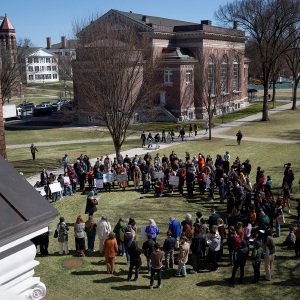 Walkout at Dartmouth calls attention to Trump’s attacks on universities, conditions in Gaza
Walkout at Dartmouth calls attention to Trump’s attacks on universities, conditions in Gaza
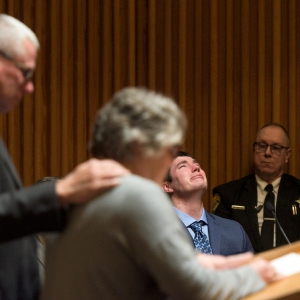 Dartmouth alumnus gets 20-to-40-year sentence in rape case
Dartmouth alumnus gets 20-to-40-year sentence in rape case
 Upper Valley Haven executive director to step down
Upper Valley Haven executive director to step down
 Hartford board backs off plans to vote on Gaza ceasefire resolution
Hartford board backs off plans to vote on Gaza ceasefire resolution
 Kenyon: The true cost of lawsuit for Dartmouth Health
Kenyon: The true cost of lawsuit for Dartmouth Health
So far, workers from Epsom, N.H.-based North Ridge Contracting have built up scaffolding and netting around the Rivermill smokestack and constructed a chute to send debris down to the ground.
They expect work to be complete in about three weeks.
The structure won’t be demolished, but rather will be dismantled brick by brick, according to the permit.
For Ford Burley, the smokestack is not only an important part of Lebanon’s mill history, but a characteristic part of Lebanon’s skyline and visually “emblematic” of the city’s mill history.
It is also one of only two remaining historic mill smokestacks in the city.
Historically there were 29 known mill sites in Lebanon, although researchers believe there were likely many more that never saw commercial use, according to the 2017 Lebanon mill survey. Throughout the 19th century and as recently as the 1950s, mills powered by the Mascoma River drove Lebanon’s economy.
“Lebanon’s mill history is really significant, it is so much of what made Lebanon throughout the 19th century,” Ford Burley said.
The Rivermill Complex was designated as a historic landmark by what is now called the Heritage Commission in 1997. This designation means the location is historically significant, but it does not place any specific restrictions on how the property is improved or changed. The complex is not included in the Downtown Lebanon Historic District.
Buildings in the Downtown Lebanon Historic District are designated under the zoning code and require a certificate of approval from the Heritage Commission in addition to meeting other planning and zoning requirements to do any significant construction.
While developers of sites designated as historic landmarks are not required to bring proposed projects before the Heritage Commission, Ford Burley said many do so voluntarily in order to learn how they can preserve the city’s history.
This project, however, did not come before the commission and, in fact, Ford Burley said she first heard about it on Facebook.
“We would prefer to be brought into these conversations and not find out after the fact, but that’s really up to the property owners,” she said.
The only other historic smokestack that still stands in Lebanon is attached to the Woolen Mill building on Foundry Street. That property is being redeveloped into a 183-unit apartment complex, however, developers plan to renovate the stack and preserve it.
Developers of the Woolen Mill project voluntarily came before the commission to discuss how to redevelop the building and preserve its historic value, Ford Burley said.
“The project we’ve been doing we recognize is a very rare opportunity to get a historic mill in a beautiful downtown on a river and have the opportunity to bring that back to life,” Woolen Mill developer Jon Livadas said in an October 2022 Planning Board meeting. “It’s not lost on us how rare that is.”
Along with Lebanon’s history generally, it is important to consider this redevelopment in the context of other recent city projects, Ford Burley said.
Ford Burley cited the demolition of the historic Lebanon Fire Station earlier this month — which was approved by the Heritage Commission because it was included in the Downtown Lebanon Historic District — the ongoing redevelopment of the brickyard site in West Lebanon and the demolition of Westboro Railyard buildings in 2021, as recent examples of historic sites being lost.
“This really feels like it’s more of the same and that this is a critical point for Lebanon to think about its history and what we’re willing to do to preserve it.”
Editor’s note: Nicole Ford Burley is a member of the Valley News’ volunteer Reader Advisory Board.
Clare Shanahan can be reached at cshanahan@vnews.com or 603-727-3216.

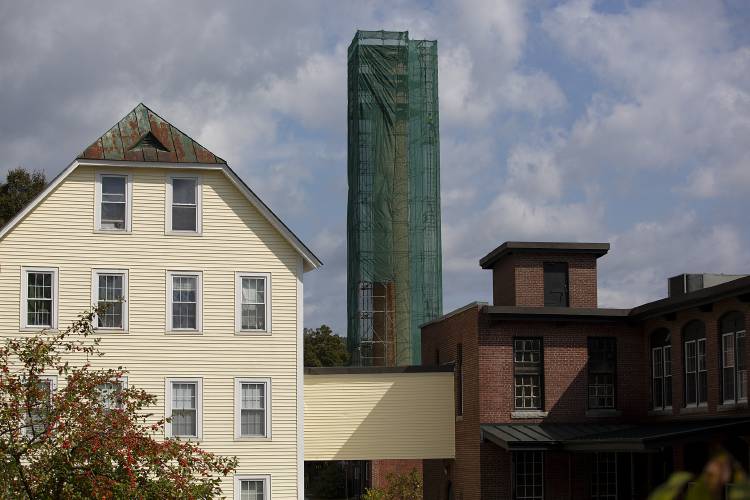
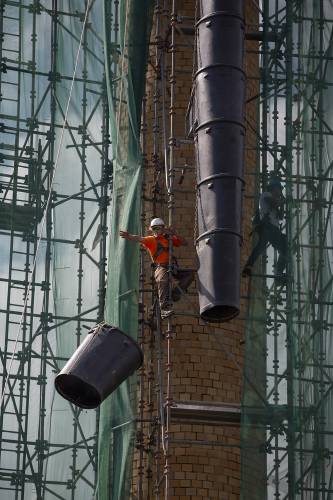





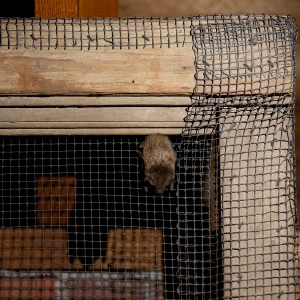 Newport school’s bat colony to be removed over spring break
Newport school’s bat colony to be removed over spring break Citing insufficient evidence, county attorney declines to prosecute former Lebanon Public Works employees who were accused of theft
Citing insufficient evidence, county attorney declines to prosecute former Lebanon Public Works employees who were accused of theft
